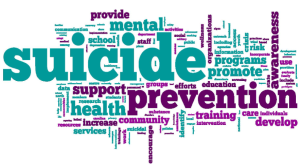 MONTGOMERY–One person dies by suicide every 13 minutes, and every day over 100 Americans take their own lives. During 2014, there were 42,773 deaths by suicide in the U.S. Suicide is the second leading cause of death for 15- through 24-year-olds, and is the 10th leading cause of death for people of all ages.
MONTGOMERY–One person dies by suicide every 13 minutes, and every day over 100 Americans take their own lives. During 2014, there were 42,773 deaths by suicide in the U.S. Suicide is the second leading cause of death for 15- through 24-year-olds, and is the 10th leading cause of death for people of all ages.
Alabama has shown a pattern of higher rates of suicide than the U.S.  national average since 1990, and in 2013, 719 Alabamians died by suicide. Suicide is the sixth leading cause of death among white males in Alabama and suicide rates are particularly high among white males ages 85 and older. Each person’s death by suicide intimately affects at least six other people, with over 200,000 newly bereaved each year.
national average since 1990, and in 2013, 719 Alabamians died by suicide. Suicide is the sixth leading cause of death among white males in Alabama and suicide rates are particularly high among white males ages 85 and older. Each person’s death by suicide intimately affects at least six other people, with over 200,000 newly bereaved each year.
In recognition that suicide is a significant public health problem in Alabama and suicide prevention is a statewide priority, Gov. Robert Bentley has proclaimed the week of September 5 through 11 as Suicide Prevention Week. The national theme for the week is “Connect. Communicate. Care.”
 Risk factors for suicide remain essentially the same regardless of where a person lives. A few examples of major risk factors for suicidal behaviors include the following:
Risk factors for suicide remain essentially the same regardless of where a person lives. A few examples of major risk factors for suicidal behaviors include the following:
· A history of depression, bipolar disorder, or other mental illness diagnoses
· A serious personal loss or number of losses and defeats taken personally
· Low self-esteem and self-loathing
· Social isolation
· Believing there is no hope for feeling better
· Chronic alcohol or other drug use
· Easy access to the means for dying, such as firearms, lethal drugs and poisons
Usually suicide is the result of a combination of these factors. Factors that help protect against suicide and suicidal behaviors include high self-esteem, social connectedness, problem-solving skills, supportive family and friends.
To address suicide prevention among community responders, the Alabama  Suicide Prevention and Resource Coalition (ASPARC) and partners in the Alabama Department of Public Health Center for Emergency Preparedness and Social Work Division hosted a conference and training.
Suicide Prevention and Resource Coalition (ASPARC) and partners in the Alabama Department of Public Health Center for Emergency Preparedness and Social Work Division hosted a conference and training.
Help is available for people contemplating suicide. The person should talk to someone such as a community mental health agency, a school counselor or psychologist, a suicide prevention/crisis intervention center, a private therapist, a family physician, a religious/spiritual leader, or call1-800-273-8255 (TALK).
For more information, contact ASAPARC at (205) 226-2400 or ASPARC.org. Resource information is available at http://www.adph.org/
Media Release/ALABAMA DEPARTMENT OF PUBLIC HEALTH/ Renae Carpenter, LCSW, PIP


